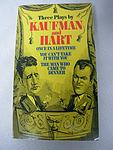George S. Kaufman
George S. Kaufman (1889–1961) was an American playwright, theatre director, and producer. He was known for his sharp wit and comedic style, which contributed to his success on Broadway. Kaufman collaborated with many notable writers, including Moss Hart and Edna Ferber, and was involved in the creation of several classic plays such as 'You Can't Take It with You' and 'The Man Who Came to Dinner.' His work earned him two Pulitzer Prizes for Drama.
Books
This list of books are ONLY the books that have been ranked on the lists that are aggregated on this site. This is not a comprehensive list of all books by this author.
-
1. The Man Who Came To Dinner
The play centers around a cantankerous radio personality who slips on ice and injures himself outside a prominent family's home, leading to an extended and unwelcome stay. During his convalescence, he takes over the household with his eccentric behavior, demanding nature, and barrage of quirky guests, turning his hosts' lives upside down. As he interferes in the family's personal affairs and meddles with the love life of his secretary, the comedy unfolds through a series of farcical situations, witty dialogue, and a parade of outlandish characters, ultimately leading to a resolution where the true nature of friendship and the impact of his overbearing personality are revealed.
The 10367th Greatest Book of All Time -
2. You Can't Take It With You
The play is a comedic tale that revolves around the eccentric Sycamore family, who lead a carefree and unorthodox life, much to the confusion and dismay of outsiders. When Alice Sycamore becomes engaged to Tony Kirby, the son of a wealthy and conservative family, the Sycamores' offbeat lifestyle clashes with the Kirbys' uptight demeanor. The ensuing chaos and misunderstandings lead to a series of humorous encounters, ultimately conveying the message that happiness and love are more important than money and social status, and that life is best lived to the fullest, without concern for societal expectations.
The 10371st Greatest Book of All Time

